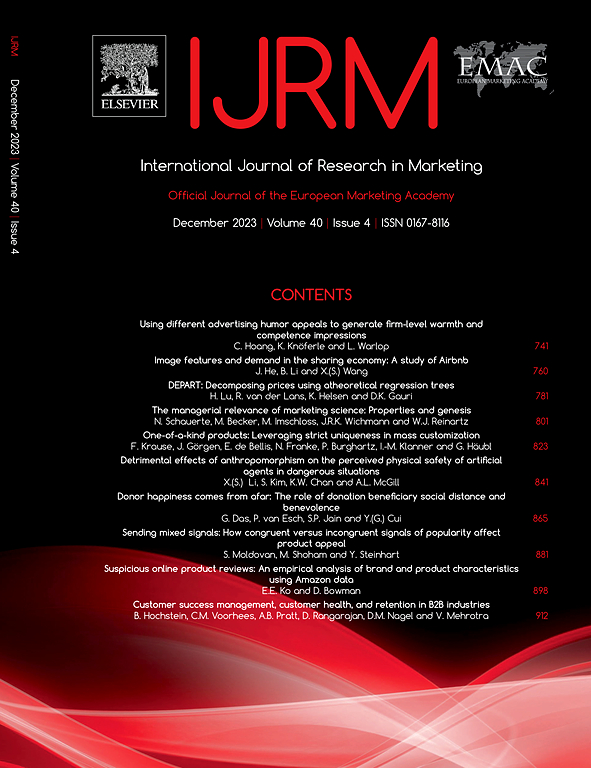Consumer responses to weakness revelation of human brands: The role of authenticity
IF 7.5
2区 管理学
Q1 BUSINESS
International Journal of Research in Marketing
Pub Date : 2025-06-01
DOI:10.1016/j.ijresmar.2024.09.005
引用次数: 0
Abstract
Human brands are an integral part of modern marketing and have proliferated in recent years, becoming one of the corner stones of the creator economy. There is a growing need to understand what specific strategies human brands, traditional ones and creators alike, can use to market and present themselves and the situational nuances of these strategies. While previous research has suggested that human brands should be generally presented in a positive light, this research shows that when human brands reveal their own weaknesses, it can lead to favorable consumer responses because of the heightened sense of authenticity. Moreover, the present research identifies three theoretically meaningful and practically relevant boundary conditions for the effect. Specifically, the effect is attenuated when the revelation is frequent and when the source of revelation is not the human brand itself, and reversed when the revealed weakness is severe. We use a mixed-method approach and provide converging support for our theorization across ten studies. This research contributes to a nuanced understanding of the weakness revelation effect in human brand marketing, and adds to the research on human brand authenticity. We further offer an explicit action plan to professional and self managers of human brands and outline the potential future research areas.
消费者对人类品牌弱点揭示的反应:真实性的作用
人类品牌是现代营销的一个组成部分,近年来已经激增,成为创造者经济的基石之一。人们越来越需要了解人类品牌(传统品牌和创造者)可以使用哪些特定策略来营销和展示自己,以及这些策略的情境差异。虽然之前的研究表明,人类品牌通常应该以积极的方式呈现,但这项研究表明,当人类品牌暴露出自己的弱点时,由于真实感的增强,它可能会引起消费者的好感。此外,本研究还确定了三个理论意义和实践相关的边界条件。具体来说,当揭露频繁且揭露的来源不是人类品牌本身时,这种效果会减弱,而当揭露的弱点很严重时,这种效果会逆转。我们使用混合方法,并为我们的十项研究的理论提供收敛支持。本研究有助于细致入微地理解人类品牌营销中的弱点揭示效应,并为人类品牌真实性的研究提供了新的思路。我们进一步为人类品牌的专业和自我管理者提供了明确的行动计划,并概述了未来潜在的研究领域。
本文章由计算机程序翻译,如有差异,请以英文原文为准。
求助全文
约1分钟内获得全文
求助全文
来源期刊
CiteScore
11.80
自引率
4.30%
发文量
77
审稿时长
66 days
期刊介绍:
The International Journal of Research in Marketing is an international, double-blind peer-reviewed journal for marketing academics and practitioners. Building on a great tradition of global marketing scholarship, IJRM aims to contribute substantially to the field of marketing research by providing a high-quality medium for the dissemination of new marketing knowledge and methods. Among IJRM targeted audience are marketing scholars, practitioners (e.g., marketing research and consulting professionals) and other interested groups and individuals.

 求助内容:
求助内容: 应助结果提醒方式:
应助结果提醒方式:


